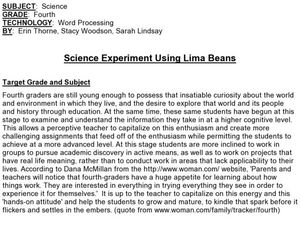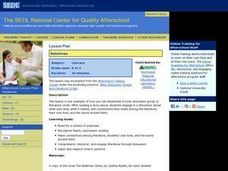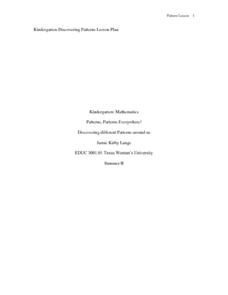Curated OER
High and Low Tides
Students collect real world data from the Web regarding high and low tides at various locations in the United States. They find a function which models this data and make predictions on tide levels based on the information found.
Curated OER
From Seeds to Plants
Second graders review the process of plant reproduction and the role of seeds in that process. The students dissect a seed, analyze their finds, collect and record data, and make predictions about seed germination and plant growth.
Curated OER
Blending with Frog and Toad
Students apply word analysis and vocabulary skills to comprehend selections by reading and interpreting a variety of literary words. They then make predictions about the story and identify blends within the English language.
Curated OER
Frankenstein Anticipation Guide
Before your high schoolers embark on the journey of Mary Shelley's Frankenstein, provide them with this prereading activity. Independently, they respond to seven statements that connect with the novel. For example, they must decide if...
Curated OER
Looking Back, Up and Ahead
Students explore how scientists have forecasted the 2002 Leonid meteor shower. They pose their own predictions for peak meteor rates per hour during the 2002 shower and compare their results with actual observed rates.
Curated OER
Science Experiment Using Lima Beans
Fourth graders tie together elements about the world and their environment. Students incorporate styles of higher order thinking skills. Students measure skills of observations, conclusions, inferences and predictions.
TELEC
What's Your School Like?
S1 and S2 language learners practice the skills of predicting and scanning as they examine images and read the script of interviews with two young students.
Curated OER
The Little Engine that Could Mini Unit Plan
The best part about teaching little ones is setting up fun, thematic learning stations. Here is a full day of activities that all relate to the story, The Little Engine that Could. Included are six different activities that cover art,...
Curated OER
The Foot Book
Students use estimation and measurement skills to make predictions and solve problems about length. They also analyze data presented to calculate ratios and percents.
Curated OER
Wagons West
Fourth graders demonstrate knowledge of the size of a wagon by making several different predictions. They develop a list of items that pioneers would need while traveling on a wagon train.
Curated OER
The Lorax and Forest Park
Students read The Lorax by Dr. Seuss and identify situations where there is a risk to the community. During a class discussion, students predict types of liter they will find in a park. Students take a field trip to the park to collect...
Curated OER
Request
Students play a game of questioning with the teacher after reading silently a beginning passage of text. They and teacher request specific information from each other until students are able to summarize and predict the outcome of the...
Curated OER
Relatives
Primary learners read the text The Relatives Came and make text to self-connections. In this literature discussion, they discuss what the text reminds them of in their own lives. They can also write down their connections and share them.
Curated OER
Mississippi Trial, 1955: Anticipation Guide
As an introductory activity to Mississippi Trial, 1955, class members use color-coded dots to respond anonymously to a series of statements about prejudice and responsibility to their fellow-man that are posted about the room. The...
Curated OER
Groundhog Day
Don't miss this resource when Groundhog Day arrives! Youngsters read the book Groundhog Day by Gail Gibbons and practice reading comprehension skills, and then choose from a series of engaging, cross-curricular activities to help...
Curated OER
Measuring and Recording Weather
Students examine instruments used to measure weather, record the data, and post it to an online weather report. They include a 24 hour prediction, keep a weather log, and graph the data.
Curated OER
Trust
Students read and discuss Romeo and Juliet Act IV, Scenes 1 and 2. They compare the unfolding action with yesterday's predictions. They consider the concepts of trust, fate, and self-determination.
Curated OER
On the Microbe Trail: An Introduction to Bacteria and Aseptic Technique
Tenth graders predict the conditions necessary for bacterial growth, test their predictions and at the same time practice the aseptic techniques and safety procedures needed when working with bacteria.
Curated OER
Only Passing Through: The Story of Sojourner Truth
Students listen to Anne Rockwell's picture book biography of Sojourner Truth
to learn about this famous abolitionist/feminist as well as slave life in New York. Students make predictions about the book as it is read aloud. Students...
Curated OER
Astronomy and the Cold War: How the United States Used the Moon to Target the Soviet Union
Students examine how astronomical observations were used to help target sites in the Soviet Union during Cold War and why such targeting was needed. Students then make predictions and observations of same astronomical events for their...
Curated OER
The End?
This lesson asks young readers to predict what will happen to Harry Potter. While the question has been answered by the last book and film in the series, the concept and links provided by The New York Times’ Learning Network are...
Savvas Learning
Verbs: Future
As part of their study of future tense verbs, language learners engage in activities, read fables, and sing songs. The 25-page packet includes detailed lessons, worksheets, graphic organizers, and answer keys for assessments.
Curated OER
Does the Supreme Court Affect Teens?: A Survey of Court Cases
Students read and restate the Ten Amendements of the Bill of Rights. They analyze Supreme Court cases using the Bill of Rights. Students make predictions about how the Supreme Court might have deicided each case. They evaluate how the...
Texas Woman’s University
Patterns, Patterns Everywhere!
Not only is pattern recognition an essential skill for young children to develop, it's also a lot of fun to teach! Over the course of this lesson, class members participate in shared readings, perform small group activities, and complete...

























